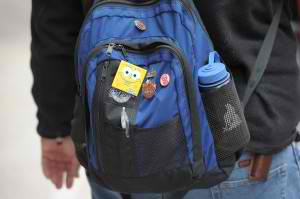10 Sep APRC’s BACK to School Guidelines
It’s that time of year where school is starting up and the kids begin to complain, assume their seated slump positions, and request lunch money. Although we cannot help you with all of that we can give you tips on proper posture, brain health, and ways to minimize injuries in school and on the field.
Sitting & Posture:
The key here is to focus on keeping your chest out and shoulders back. Exercises that can help are core exercises on a stability ball, Superman exercise, reverse flies with a resistance band, and many more.
In between classes make sure to stand up and walk around, if time or space allows it, can do some gentle torso twists or side bends.
Brain Health:
A happy gut is a happy brain. If your stomach is bothering you, then you cannot focus on school and will not be feeling well. Your stomach doesn’t always have to be causing you pain in order for your brain and body to be affected. Allergies and food intolerances can cause many symptoms like headaches, irritability, rashes, insomnia, and nervousness among others. Minimize this by limiting your sugar and processed food intake – eat whole foods regularly every 2-3 hours that are low glyemic –
Veggies – the greener the better but a diet in all colors is ideal
Lean protein – chicken/wild caught fish/organic meats
Fruits – berries are ideal, limit Melon/Mangoes/Pineapple
Nuts – Raw almonds/cashews/walnuts/brazil nuts
If diet change and exercise is not giving you the results you’re looking for, Dr. Teytelbaum would be happy to provide consultation on how to help you achieve your goals through a natural, holistic treatment called Functional Medicine.
Sports Injury Prevention:
The key to minimizing risk is to make sure you are well balanced and focused for your sport. Prior to practice/games make sure you have foam rolled and dynamically stretched so nothing is bothering you at all. Always go through your specific sports motions physically and visually and make sure you are ready to go. If an injury does occur or you are interested in ways to optimize your performance, the doctors at APRC will be happy to help or refer out appropriately.
Sleep:
Sleep affects everything! Research shows that proper sleep can decrease sugar cravings, increase focus and energy and affects your emotional wellbeing. Sleeping 7-8 hours/night seems to be the ideal range for most people.
We hope these guidelines help make your lives better and happier!
Learn more about what we do at www.aprcnj.com or call 973-467-9011.
Backpacks: A heavy lift for NJ school children
With the start of the school year right around the corner, parents should be aware of an important, but often overlooked safety issue for their children.
Backpack-related injuries force nearly 5,000 children to the emergency room each year.
Those injuries typically occur in the back, neck and shoulder areas with kids experiencing a multitude of different pains and ailments.
“They have quite a bit of trouble with pain and discomfort, muscular tightness, and curve changes because of these backpacks,” said Dr. Jeannine Baer, of the Association of New Jersey Chiropractors.
Other possible injuries include spasms, pinched nerves and posture problems.
In fact, the American Chiropractic Association has put out recommended guidelines for just how much weight children should be carrying in their backpacks, along with many other useful tips.
“The backpack should really be less than 10 to 15 percent of your child’s total body weight,” Baer said.
Another New Jersey chiropractor, Dr. Joseph Bednar, said if a child is bent forward at the waist with his backpack on, that means it is too heavy.
He, too, believes that backpack should be about 15 percent of their body weight. Bednar even recommends that parents load up their kid’s backpack with books and supplies, put it on the scale, and then do the math from there.
Most experts agree, though, that this issue goes beyond just the pure weight of the backpack. The type of bag a child uses is extremely vital, too.
Dr. Baer said kids want to look cool at school, so it often becomes a tug-of-war between style and safety.
“The best kind of backpack for your kids to be wearing is the two shoulder strap backpack,” she explained. “And they really should be wearing it on both shoulders. That should be a non-negotiable.”
She urged parents to make sure the backpacks are adjusted high and tight, not allowing it to sit loose and hang low.
Baer said she comes across most of these injury cases for kids between 7th and 10th grades as their workload increases and they get acclimated to either middle or high-school. She said they typically happen in the early part of the school-year since many students are not 100 percent confident yet in their assignment and note-taking skills.
That could often lead to lugging around and taking home more books than usual to make sure they have their bases covered.
The doctors also stressed the importance of not flinging the backpack over your shoulders when you lift it. Instead, they suggest using your legs while picking it up.
Bednar shared four simple tips for parents to ensure backpack safety for their children.
“Choose right, pack right, lift right, wear right,” he said.
Read More: New Jersey 101.5

